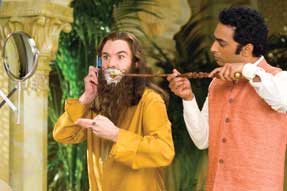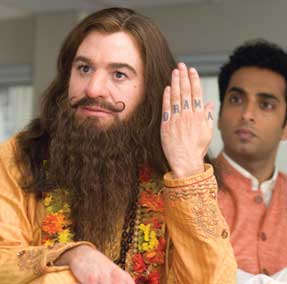Arts
The Boring Guru

The Love Guru (2008), directed by Marco Schnabel, disgraced by Mike Myers and made famous by Rajan Zed
|
There are many reasons for disliking The Love Guru. Just count the ways! Had it not been for the wide-spread consciousness-raising brought upon by Rajan Zed and other (unseen) protestors, one would not have to see this film. If you are a fan of Mike Myers, then perhaps you have some infantile desire to watch it. But otherwise, the scorching sun and the humidity of summer months is so much nicer. Mike Myers specializes in creating characters that suffer from arrested development. All of us get over the poop and pee and penis jokes as we grow up. The other little thing we learn, as part of our normal socialization is to feel secure in the world. We learn not to produce nervous laughs. Some of us see shrinks to find a cure for it.
If you are a comedian, even at your own parties, you wait for others to laugh. In the Indian tradition you have Chamchas around so you don’t have to demean yourself by providing your own laugh track. Mike Myers, who clearly views himself as a comedian, laughs at his own antics, if we can raise the semantic level of that word. He has an obsession with short people/dwarfs/midgets and abuses them by tossing them around or kicking them for his own laugh. If you must, please watch his films just to see how we embrace abjection in our own lives and how a whole crowd can be downgraded below even the lowest denominator. Now, reportedly because of the therapies he received for his depression, and apparently because of the great reverence he acquired for Deepak Chopra, Mike Myers has turned his attention to the “Guru Business.” Admirable idea indeed! He is not quite poking fun at Hinduism you see, but the banal mockery of it by gurus (including Deepak Chopra, who appears in a lackluster cameo and blessed the film). Now there is so much to make fun of here, don’t you think! The pompousness of these gurus, the commodification of a great tradition, their unexplained lust for money and women! There is no end to this. Mike Myers has a lovely and precious plot line in his hands. Plus, let us admit, there is lot to make fun of when it comes to Hinduism. Like all great traditions it is as vulnerable as it is venerable. Parody makes the object richer. It invites sharper tools of insights and attention. If religions were perfect, we would not be so blinded by them and, even more importantly, we would not kill in their name. The objective of Guru Pitka in The Love Guru is to attain the stature of Deepak Chopra so he could appear on the Oprah Winfrey show. He wants to do this by saving the marriage of a football player with advice on relationship and kindness. Again, a commendable goal in an era marked by banality!
Give all this to Mike Myers and you can see him regresses before your eyes, with his depthless and humorless forays into sexuality (with lots of penis jokes), into pop-psychology of advice based on nothingness. There is as much connection between all this and Hinduism as there is between Sean Hannity and reason, or between Genghis Khan and kindness…. The film is replete with dirty jokes and double entendres that do not work. To top it all, Mike Myers laughs approvingly and admiringly at himself in a technique that underscores his lack of comedic command. One wishes he could hear the lack of laughter in the theater. If this were not enough, Ben Kingsley demeans himself by appearing cock-eyed (is he short on money?) as Guru Pitka’s guru who indulges in producing his own piss (which makes a mop wet so Pitka could fight with it). A film that barely mentions Hinduism, which, it is clear, would be hard for Mike Myers to understand, let alone grasp, has already disappeared from theaters and has been uniformly panned by critics. Dana Stevens, writing in Slate, called it a “tour of someone’s large intestine” and “the most joy draining 88 minutes I have ever spent outside of a hospital waiting room.” Why even grace this film with any attention, let alone serious consideration? Rajan Zed, a Nevada cleric who led a public campaign against the film for being anti-Hindu ought to lighten up. There must be other ways to attract attention to yourself than by protesting a foul film that stinks days after you have seen it. There is no need to defend Hinduism. It has done remarkably well for thousands of years, despite the paranoia and the fanaticism of some. It has done well even poking fun at itself. It does not proselytize; it is humble and it laughs at others who laugh at it. We should be laughing at all religions. After all, gods created laughter and unlike Mike Myers, the gods know how to laugh at themselves. Just listen! All this hoopla surrounding the release of the film, which got Paramount at least some viewers, brings to memory an old joke about Indians. The great philosopher Immanuel Kant explains in Critique of Judgment that the genesis of a joke comes from “from the sudden transformation of a strained expectation into nothing.” His example, in 1790 was that of an Indian (presumably the original Indian). As the contents of a beer bottle bubbled over after an Englishman opened it, an Indian was amused. He explained: “I am not amused at how it came out, but I am amazed how you managed to get it all in.” The lack of reason in making sense of this incongruity makes for an Indian in this joke. Mike Myers and Rajan Zed are both successors of this logic. They have no idea how all the bubbles got there. Will they ever? The problem with this film is that you cannot even enjoy the bubbles bubbling over.
|



